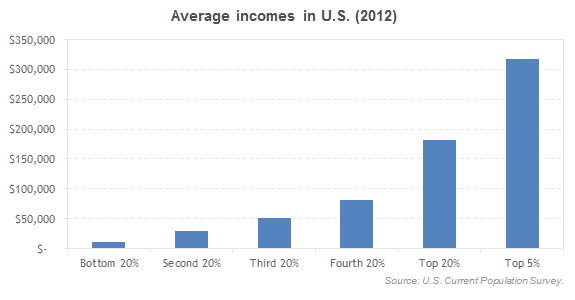It’s no secret that there is an increasing divide between the wealthy and the poor in the U.S., but the Americans suffering the greatest increase in income inequality are those entering their prime earning years – which means an even deeper division is looming down the road.
The income gap is the spread between the highest-paid members of the workforce and the lowest-paid– typically the top 20 percent of earners and the bottom 20 percent. According to an analysis by BankRate.com of the U.S. census data on age and income, the spread between high earners and low earners has spread across all age cohorts, but has been most pronounced among those between ages 35 and 54, the period when most individuals are trying to become financially stable and to build for retirement.
Related: Obama Takes Aim at America’s Growing Income Gap
Between 1992 and 2012, the gap between the highest earners aged 35 to 44 jumped by 21 percent while the spread for those aged 45 to 54 jumped by 17.6 percent.

“These are folks who are just entering their prime earning years,” said Chris Kahn, research and statistics analyst for BankRate.com, which analyzed the data. “They’ll be earning the best paycheck they ever will. You have to start asking, 10, 20 years from now, when we’re measuring income then, where are they going to be?”
In an interview, Kahn said that the primary reasons for the spread between the highly-compensated and the poorly-compensated include persistently high levels of unemployment and stagnation in wage rates for those in the low and middle-income brackets.
Related: The Fed Is Widening the Income Gap ... and That's a Good Thing
When you change the focus from income disparity to wealth disparity, Census Bureau figures show that the age cohort in the U.S. with the largest gap between rich and poor is individuals aged 65 and older.
The fact that the income gap among individuals in their peak earning years today had grown so significantly sends a worrying signal about future increases in wealth disparity among the older population.
“Widening income gaps today predict larger wealth gaps in the future,” said Alan Berube, a senior fellow at the Brookings Institution who studies economic and social policy.
Berube pointed out that the numbers may be even worse than they appear because today’s current retirees are among the last to benefit from defined benefit pension programs, which guarantee a certain level of income in retirement. Today’s private sector workers, if they have a retirement program at all, are almost exclusively participating in defined contribution programs, in which employers contribute either a set percentage of earnings or match a maximum contribution to an employee’s retirement fund.
For those in defined contribution programs, low wages mean low contributions, which translate into a smaller retirement nest egg.
Related: 5 Years After the Crisis: Why the Income Gap Is Widening
“Younger workers are in defined benefits programs, and their income in retirement will more closely track their income in their working years,” he said.
The public policy effects could be significant, Berube said.
“It goes to the future viability of a program like Social Security,” he said. “It’s designed to provide a guaranteed income for all groups in retirement but it’s progressive, so it does more for lower income seniors than middle and high income seniors.”
However, he pointed out, the progressive nature of Social Security means that thegreater the wealth inequality is among Social Security beneficiaries, the less important the program becomes to the most well off. As inequality increases, Social Security payments will make up a smaller and smaller portion of wealthy retirees’ income.
This is particularly significant to the future of Social Security, because retirees tend to be more politically engaged, and well-off retirees tend to be among the most prolific donors to political causes.
Simply put, if well-off seniors stop caring about Social Security, politicians in Washington might, too.
Follow Rob Garver on Twitter @rrgarver
Top Reads at The Fiscal Times:





